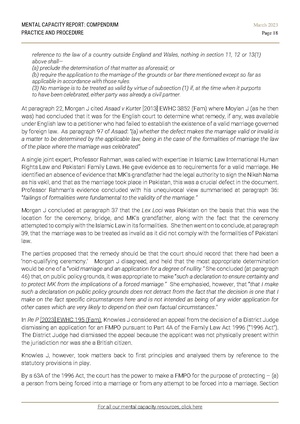Re P (Appeal: Forced Marriage Protection Order: Jurisdiction) [2023] EWHC 195 (Fam)
Essex
This case has been summarised on page 18 of 39 Essex Chambers, 'Mental Capacity Report' (issue 130, March 2023).
ICLR
The ICLR have kindly agreed for their WLR (D) case report to be reproduced below. For full details, see their index card for this case.
The WLR Daily case summaries
High Court— Forced marriage protection orders— Power to make orders— American wife resident in US seeking forced marriage protection order against British husband— Husband British citizen resident in England— Whether UK court having jurisdiction to make order where wife neither physically present in jurisdiction nor British national— Family Law Act 1996 (c 27), ss 63B, 63CA — Human Rights Act 1998 (c 42), s 3, Sch 1, Pt I, arts 3, 8
The applicant wife, who was Pakistani by descent and a citizen of the United States of America where she was living, sought a forced marriage protection order (“FMPO”) pursuant to Part 4A of the Family Law Act 1996 alleging that while visiting Pakistan in 2014 she had been forced into marrying the respondent husband, a first cousin with dual British and Pakistani nationality who was resident in England. The district judge dismissed the application on the basis that, since the wife was neither physically present in the jurisdiction nor a British citizen, the 1996 Act prevented her from making the order. The wife appealed, arguing, inter alia, that the protective/injunctive jurisdiction of the Forced Marriage (Civil Protection) Act 2007 needed to be considered proactively since it was extraterritorial in its application and particularly important in a world of global social media and other internet platforms.
On the appeal—
Held, appeal allowed. (1) The Family Law Act 1996 was drafted in the widest and most flexible terms, the only specific requirement for the court to consider when making a forced marriage protection order being that it should take account of “all the circumstances”. There was nothing in the Act which required the court to apply any given criteria beyond the matters identified in section 63A(2) as those to which the terms of an order could relate. The wording of section 63B(2) explicitly included within those matters conduct outside England and Wales and section 63B(2)(b) and (c) covered not just respondents but other persons who were or might become involved in other respects in relation to a forced marriage or an attempt to force a person to enter into a marriage, which necessarily included individuals who were not present or habitually resident in the jurisdiction and were not British nationals. Accordingly, it was plain that the 1996 Act had extraterritorial application. The position under the 1996 Act, as amended by section 120 of the Anti-Social Behaviour, Crime and Policing Act 2014 to introduce section 63CA setting out the offence of breaching an FMPO, was therefore consistent with section 121 of the 2014 Act which provided for the criminal offence of forced marriage and made it clear that as long as, at the time of the conduct or deception outside of England and Wales, at least one of either the victim or perpetrator was habitually resident in England and Wales or at least one of them was a United Kingdom national, the perpetrator would commit the offence of forced marriage. Moreover, as forced marriage was not only a very serious form of domestic abuse but also a fundamental abuse of a victim's human rights under articles 3 and 8 of the Convention for the Protection of Human Rights and Fundamental Freedoms, a purposive interpretation of the 1996 Act in accordance with section 3 of the Human Rights Act 1998 permitted the courts to exercise their protective jurisdiction to safeguard victims wherever they were based and whatever their nationality (paras 36–41).
Dicta of Sir Nicholas Wall P in In re A (Forced Marriage: Special Advocates) [2012] Fam 102B, paras 17–18 and dicta of Sir Andrew McFarlane P in In re K (Secretary of State for Justice intervening) [2020] Fam 283B, paras 30–34, CA applied.
Al-Jeffrey v Al-Jeffrey (Vulnerable Adult: British Citizen) [2018] 4 WLR 136B and In re KBH (Forced Marriage Protection Order: Non-resident British Citizen) [2018] 4 WLR 137B distinguished.
(2) Forced marriage was a global phenomenon with many forced marriages in the UK having an international dimension. In a world of global social media, it was possible for perpetrators to continue their abuse online with easy access to their victim wherever that victim was based and whatever their nationality. Here, applying the route map identified in authority, and being satisfied that the wife had been forced into marriage by the husband and other members of their extended families and that there was a need to protect her from the husband’s ongoing harassing and intimidatory behaviour, the court would make the FMPO together with an order preventing ongoing contact between the parties save via their respective legal advisors, that order to remain in force until varied or terminated by a subsequent court order (paras 43, 48–50).
Dicta of Sir Andrew McFarlane P in In re K [2020] Fam 283B, paras 45–55, CA applied.
Teertha Gupta KC and Naima Asif (instructed by Dawson Cornwell) for the wife.
The husband did not appear and was not represented.
Jeanette Burn, Barrister
Referenced Legislation
Family Law Act 1996 (c 27), ss 63B, 63CA
Human Rights Act 1998 (c 42), s 3, Sch 1, Pt I, arts 3, 8
Full judgment: BAILII
Subject(s):
- Miscellaneous cases🔍
Date: 2/2/23🔍
Court: High Court (Family Division)🔍
Judge(s):
- Knowles🔍
Parties:
Citation number(s):
- [2023] EWHC 195 (Fam)B
- [2023] WLR(D) 64B
- [2023] 3 All ER 77, [2023] 2 FCR 625, [2023] 2 WLR 769B, [2023] Fam 165B
Published: 17/3/23 11:55
Cached: 2025-06-19 23:04:03
